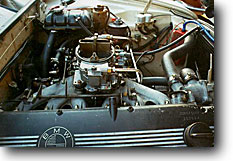| The key phrase here is "if it catches on."
There are no less than 14 of these new compounds approved
by the EPA/SNAP as R12 Freon replacements (there is no such
thing as a "drop-in" replacement for R12, per the EPA, there
is a $25,000 fine if you add a blend without a retrofit and
a $10,000 reward for whoever turns you in). All of them are
"blends" of other refrigerants and in some cases, butane,
iso butane, or propylene. The above mentioned GHG (R406A),
also GHG-HP and GHG-X4 are in this group.
GHG is a "blend" of 55% HCFC-22, 41% HCFC-142b,
and 4% iso butane (flammable). GHG-HP and GHG-X4 are variations
on the theme, from the same manufacture.
The three more widely accepted (?) of these
fourteen and have a chance of catching on, are FRIGC FR-12,
FreeZone, and Freeze 12. Both Freeze 12 and FreeZone are 79-80%
R134a anyhow. Two are owned by large corporations like Penzoil,
etc.., and have the clout to have the chance of becoming a
regular. Right now they have a very very small market share.
All posts to the iATN E-Mail list are very contrary to these
blends ever getting more of that market share.
Each refrigerant must have its own dedicated
equipment for evacuating, recycling and cleaning of that specific
R-XXX. Most shops now have this dedicated equipment for R-12
and R-134a, but not the blends. Except, of course, the shop
that put it in your car for you, maybe. Make sure he warranties
the parts he sells you, because his parts distributor will
not. These blends cannot be cleaned and recycled at the shop
and must be sent to the manufacture to be cleaned and recycled
if possible, this stuff becomes Hazardous Waste to these shops,
requiring special disposition. These shops invest many $$$$
into this equipment and more $$$$ into refrigerant identifiers
to protect that investment, any hint of other refrigerants
will void all warranties. They even test factory sealed "virgin"
refrigerant bottles.
That goes for warranties on parts you pay for.
Manufacturers of A/C parts (compressors, expansion valves,
accumulators, dryers, etc..) say their warranties are void
if any other refrigerants are used.
Each refrigerant is required to have special
unique fittings in place of the old service port fittings
and have a detailed label prominently displayed close to the
service ports to prevent cross contamination.
The chances of getting caught in BFE or Podunkville
with out air and not being able to get it fixed are very great
if your system is not R-134a or R-12.
Some of these blends tend to ruin seals and
eat rubber in systems not designed for that particular refrigerant,
so now you have to go back through and put in new seals, compressor,
and replace the hoses with barrier hose anyway. I know of
no systems or components designed for any of the blends. If
you just put new parts on the system, the warranty is void
and you will have to buy them again.
Each of the blended components leak out at different
rates, changing the characteristics and cooling properties
of the refrigerant, even in a good tight system as it ages.
Caution, personal opinion:
I don't want to be in a car that has a leak in
the evaporator with butane in the A/C. BOOM! 8^)
At a 4% concentration? Possible but not likely.
Must be a by-product of that research he's done with BBQ's.
Us do-it-yourselfers have more flexibility.
We are bound by most of the same laws that govern the shops,
but how many of us have ever pay attention to them and have
rented, borrowed, or bought a machine to evacuate and recycle
R-12 let alone R-134a or one of the blends? Or went to the
effort to build the equipment your self(later in this post)?
DIYers need be concerned with only the one refrigerant they
choose, one set of tools for those special fittings, and we
know exactly what is in the system. DIYers can pick one refrigerant
and stay with it and hope it is still available next year
when you need to do it again, or, to just top off for the
summer.
Last week I talked at length with a shop using
FreeZone and found that, even with this direct replacement
refrigerant, there are problems. He noted that he had to remove
hoses and clean all of the mineral oil in the lines and especially
the expansion valve or it would clog and not operate. How
many other problems with these other refrigerants that have
not come to light yet?
Caution, personal opinion:
If you have to take the system that far down, what's the difference
in going back with R134a or, a blend of R134a and other stuff?
Those of you that are not DIYers, and those
planning to sell their car to a non-DIYer need to do your
home work. Caution: personal opinion: You basically have a
choice. A common refrigerant made by many manufactures and
put in most or all new cars and almost all shops can work
on, or something like
GHG REFRIGERANT-12 SUBSTITUTE "...it is now
manufactured at People's Welding Supply (next to Nick's)
on the Levee in W. Lafayette. It has been used in over 2,000
cars and over 10,000 pieces of other refrigeration equipment
by 1994...."
http://worldserver.com/R-406A/peoples/ghg/ghg.html
However,
http://www.dcc.edu/vettenet/acfaq.txt
, this A/C FAQ page has a pretty good arguments for
this refrigerant and a lot of other stuff and basically
nothing good to say about the EPA and DuPont. An excellent
page but it seemed to be a little old, not updated for a
long time, a year or more. It also goes on to explain how
to make your own refrigerant and equipment. Most of the
text can be attributed to either George Goble or John DeArmond.
It explains what George did with the rest of that BBQ.
One final personal
opinion: I bought and squirreled away 70 lbs of
R 12 a couple of years ago before it got costly, figuring
that will be more than enough to keep me supplied until all
this crap shakes out.
The following are some of the pages I have used
to research and come to the above comments and personal opinions.
|



